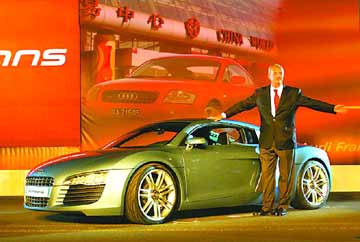|
Audi aims to drive away from rivals
By Liu Shinan
Updated: 2004-03-01 14:38
Global auto giant Audi says it will maintain its luxury image in China by sticking to the premium sector of the market, even though the strongest demand in the world's third-largest automobile market was for middle and lower-priced cars in 2003.
But the company hinted at the possibility of a price drop for its Chinese-produced A4s when the production volume of the Class B sedan increases significantly.
"This year I think we'll able to do this," said Andreas Schleef, a management board member of Audi AG, last Wednesday at the company's annual press conference. "This year we'll be increasing our production volume, so the A4 quantities will form the basis of a very reasonable price offer to customers."
Erich Schmitt, who is in charge of purchasing, finance and organization, said the company will focus on the high-end market because Audi is a top brand.
Private ownership of passenger cars soared dramatically in 2002 and 2003. Chinese citizens bought 1.19 million sedans in 2002 and 2.07 million last year.

World leading auto maker Audi said it was to stick to the high-end market in China. Standing in the filephoto is Martin Winterkorn, the firm's chairman of the board of management.[newsphoto] |
The buying sprees were triggered by the falling prices of domestically made cars.
In turn, it prompted domestic and foreign car makers to expand their production in, and exports to, China.
Many world players, such as Volkswagen, Honda, Toyota, General Motors and Citroen, raced against each other to seek Chinese partners to churn out middle and lower-priced cars, targetting the nation's rising "middle class."
But Audi seems disinterested with such heavy traffic -- although it was among the earliest to co-operate with a Chinese partner to produce sedans locally.
In 1988, Audi franchised the Changchun-based First Automotive Works (FAW) to manufacture 499 units. Since then, the joint venture has produced models ranging from the Audi 100 to the Audi 200, the A4 and A6.
Schmitt said Audi has no intention of joining the rivalry at the lower end of the market.
He said the company was looking to China's rich and expressed confidence that they will continue to grow in number.
"In a mature market, such as Europe, luxury cars generally account for 25 per cent," Schmitt said. "When China develops to that stage (of market maturity), the demand for top brand cars will also rise to 25 per cent. By then, you will realize that our choice today is correct."
His remarks coincided with the latest revelations by Chinese analysts.
Xiao Guopu, vice-chairman of the Shanghai Automobile Industry Corp, said the sales of middle and high-class cars grew rapidly last year while low-end products became harder to peddle.
Last year, Audi sold 63,531 cars, including those produced in China, in the Chinese market. According to statistics provided by Audi, 75 per cent of the cars were bought by private customers.
"China has become the fourth largest Audi market (after Germany, the United States and Britain)," Martin Winterkorn, Audi's chairman of the board of management, said in a speech at the annual conference.
Major foreign auto makers are intensifying their inroads into the local market as China will lift vehicle import restrictions in 2006.
BMW announced last March that it would produce its 3- and 5-series models. Daimler-Chrysler also announced in September that it would make Class C and Class E Benz models in a venture with the Beijing Automotive Holding Corp. In November, General Motors announced its plan to manufacture Cadillacs in Shanghai.
The fact that the auto giants have all started setting their sights on the luxury car market reflects the real market condition.
In the past two years, compact cars have recorded poor performances despite their prices falling. But all luxury cars, such as those produced by Honda and Audi, have sold like hot cakes.
Of the sales of Volkswagen -- the parent company of Audi AG -- in China, Audi makes up only 10 per cent, but it contributes to more than 60 per cent of local profits, suggesting a high profit rate for luxury cars.
In spite of growing competition, China still has a very low vehicle density of around one vehicle per 100 inhabitants, illustrating its considerable growth potential.
The sustained dynamism of the Chinese economy has produced a string of record-breaking years. All indicators including gross domestic product, foreign direct investment, foreign exchange reserves and trade volumes have posted growth rates way above the world average.
While its revenue from business in North America fell by 12.5 per cent to 2.5 billion euros last year, Audi boosted its revenue in China by 120 per cent to more than 1.2 billion euros, Audi's Rupert Stadler, finance and organization board member, said in his report to last week's annual conference.
|